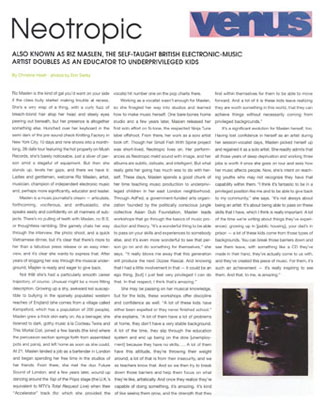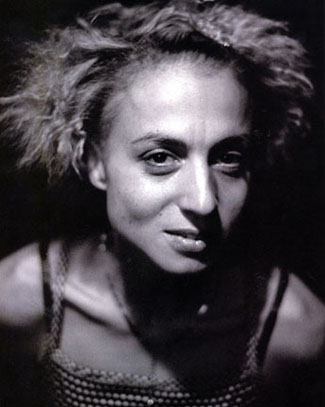
NEOTROPIC
ALSO KNOWN AS RIZ MASLEN, THE SELF-TAUGHT BRITISH ELECTRONIC-MUSIC ARTIST DOUBLES AS AN EDUCATOR TO UNDERPRIVILEGED KIDS
Riz Maslen is the kind of gal you'd want on your side if t he class bully started making trouble at recess. She's a wiry wisp of a thing, with a curly fuzz of bleach-blond hair atop her head and steely eyes peering out beneath, but her presence is altogether something else. Hunched over her keyboard in the semi-dark of the pre-sound check Knitting Factory in New York City, 10 days and nine shows into a month-long, 28-date tour, featuring the hot property on Mush Records, she's barely noticeable, just a sliver of a person amid a stageful of equipment. But then she stands up, levels her gaze, and there we have it: Ladies and gentlemen, welcome Riz Maslen, artist, musician, champion of independent electronic music and, perhaps more significantly, educator and leader.
Maslen is a music journalist's dream -- articulate, forthcoming, vociferous, and enthusiastic, she speaks easily and confidently on all manners of subjects. There's no pulling of teeth with Maslen, no B.S. or thoughtless rambling. She gamely chats her way through the interview, the photo shoot, and a quick Vietnamese dinner, but it's clear that there's more to her than a fabulous press release or an easy interview, and it's clear she wants to express that. After years of slogging her way through the musical underground, Maslen is ready and eager to give back.
Not that she's had a particularly smooth career trajectory, of course. Unusual might be a more fitting description. Growing up a shy, awkward kid susceptible to bullying in the sparsely populated western reaches of England (she comes from a village called Kempsford, which has a population of 200 people), Maslen grew a thick skin early on. As a teenager, she listened to dark, gothy music a la Cocteau Twins and This Mortal Coil, joined a few band (the kind where the percussion section springs forth from assembled pots and pans), and left home as soon as she could. At 21, Maslen landed a job as a bartender in London and began spending her free time in the studios of her friends. From there, she met the duo Future Sound of London, and a few years later, wound up dancing around the Top of the Pops stage (the U.K.'s equivalent to MTV's Total Request Live) when their "Accelerator" track (for which she provided the vocals) hit number one on the pop charts there.
Working as a vocalist wasn't enough for Maslen, so she finagled her way into studios and learned how to make music herself. One bare-bones home studio and a few years later, Maslen released her first solo effort on N-tone, the respected Ninja Tune label offshoot. From there, her work as a solo artist took off. Though her Small Fish With Spine project was short-lived, Neotropic lives on. Her performances as Neotropic meld sound with image, and her albums are subtle, delicate, and intelligent. But what really gets her going has much less to do with herself. These days, Maslen spends a good chunk of her time teaching music production to underprivileged children in her east London neighborhood. Through AdFed, a government-funded arts organization founded by the politically conscious jungle collective Asian Dub Foundation, Maslen leads workshops that go through the basics of production and theory. "It's a wonderful thing to be able to pass on your skills and experiences to somebody else, and it's even more wonderful to see that person go on and do something for themselves," she says. "It really blows me away that this generation will produce the next Dizzee Rascal. And knowing that I had a little involvement in that -- it could be an ego thing, [but] I just feel very privileged I can do that. In that respect, I think it's amazing."
She may be passing on her musical knowledge, but for the kids, these workshops offer discipline and confidence as well. "A lot of these kids have either been expelled or they never finished school," she explains. "A lot of them have a lot of problems at home, they don't have a very stable background. A lot of the time, they slip through the education system and end up being on the dole [unemployment] because they have no skills. . . . A lot of them have this attitude, they're throwing their weight around; a lot of that is from their insecurity, and we as teachers know that. And so we then try to break down those barriers and help them focus on what they're like, artistically. And once they realize they're capable of doing something, it's amazing. It's kind of like seeing them grow, and the strength that they find within themselves for them to be able to move forward. And a lot of it is these kids leave realizing they are worth something in this world, that they can achieve things, without necessarily coming from privileged backgrounds."
It's a significant evolution for Maslen herself, too. Having lost confidence in herself as an artist during her session-vocalist days, Maslen picked herself up and regained it as a solo artist. She readily admits that all those years of sleep deprivation and working three jobs is worth it once she goes on tour and sees how her music affects people. Now, she's intent on reaching youths who may not recognize they have that capability within them. "I think it's fantastic to be in a privileged position like me and be able to give back to my community," she says. "It's not always about being an artist. It's about being able to pass on the skills that I have, which I think is really important. A lot of the time we're writing about things they've experienced; growing up in [public housing], your dad's in prison -- a lot of these kids come from those types of backgrounds. You can break those barriers down and see them leave, with something like a CD they've made in their hand, they've actually come to us with, and they've created this piece of music. For them, it's such an achievement -- it's really inspiring to see them. And that, to me, is amazing."
CHRISTINE HSIEH
